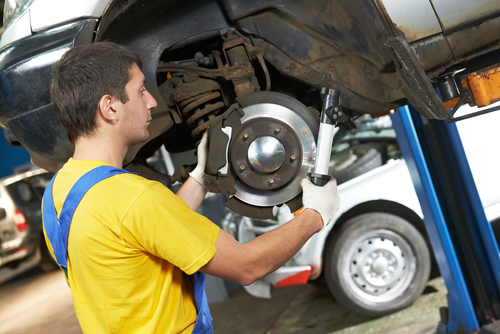When driving it is of utmost importance that all vehicles have the ability to slow down or stop whether it be voluntarily or suddenly. Being able to stop ensures your safety and the safety of others. Regular maintenance and prompt repairs to any existing issues serve to make sure that the brakes on your vehicle are up to standard.
Brakes For Safety
 Understanding the way the braking system work will give you the ability to recognize when something isn’t right or has malfunctioned. The majority of vehicles manufactured today are comprised of either drum or disc braking systems. To get more into detail here is a simplified summary of the way each system functions. These include:
Understanding the way the braking system work will give you the ability to recognize when something isn’t right or has malfunctioned. The majority of vehicles manufactured today are comprised of either drum or disc braking systems. To get more into detail here is a simplified summary of the way each system functions. These include:
-
Disc brakes – Here when a person presses on the brake pedal the hydraulic system increases that pressure which in turn causes the calipers to push the brake pads against the rotor. This results in the vehicle slowing down or stopping.
- Drum brakes – Drum braking systems basically function on the same principle. Here once the brake pedal is pressed down the hydraulic system further pushes the brake shoes against the drum. The drum is attached to the hub of the wheel so once this action is performed the car slows down and comes to a stop.
In effort to ensure that braking systems are up to standard when taking vehicles for scheduled oil changes drivers should use this opportunity to get their braking system inspected. This inspection usually includes a fluid level and condition check, an inspection of the brake pads/shoes for wear and a thorough manual check for fluid leaks.
As it relates to the individual components of the braking system issues can certainly arise if one or more of them has malfunctioned and may need replacing. One common cause of brakes not functioning as they should are worn out brake pads. Worn brake pads causes metal on metal grinding on rotor surfaces and also increases the distance in which the vehicle needs to brake.
If a vehicle begins to make a squeaking sound this may be a result of a crack/s in the brake pad surface caused from overheating. This causes the vehicle to squeak or squeal when stopping. So if a driver encounters any of the following issues they know that brake pads need to be replaced.
Leaks are also another common cause of malfunctioning brakes. These mainly stem from within the hydraulic system and result in the loss of braking fluid. Signs that indicate a vehicle may have a leak in the braking system are fluid pooling under the vehicle and very low pressure when the brake pedal is pressed on. Again this is an urgent concern that should be addressed right away.
Rotors are the mechanism to which the brake pads come into contact with and need to be flat to function correctly however if they are damaged from heat or cracking this will cause the brake pedal to pulsate and the vehicle to jerk or have difficulty when stopping.
For most vehicles brake inspection is typically performed when needed however it is recommended that this be conducted as regular as your oil change. It’s always best to get any issue with your vehicle repaired promptly as it can save you from spending more in the future and put your mind at ease while driving on roads. Contact us for more information.

